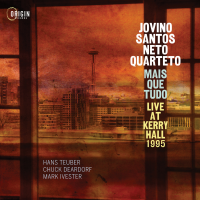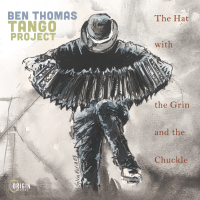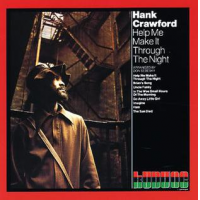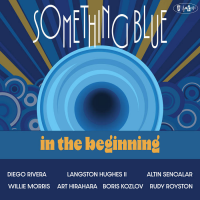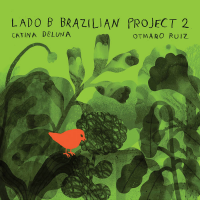Home » Jazz Articles » Liner Notes » Charnett Moffett: The Bridge
Charnett Moffett: The Bridge
Alone with his upright bass, Moffett has created an engaging hour of organic, richly detailed and fundamentally physical sounds. He lays down 20 concise and immediately enjoyable performances, exploring motifs that have had true resonance for him throughout his formidable career. He establishes his links to the lineage of iconic jazz bassists, and demonstrates his personal, advanced techniques for this heaviest of stringed instruments, the tether that, since its invention, has bound melody, harmony and rhythm together. He gives himself unstintingly to this project and, so doing, renews himself.
In fact, this is Charnett's process: He has never stopped growing throughout the three decades he has been at the heart of brave new music. Receiving his first bass (a half-sized one) at age seven, recording that year—and then touring Japan with the Moffett Family Band—Charnett has been at the 'bottom' of things (pun intended) from the beginning of his musical life. His father Charles was a drummer with Ornette Coleman, and so as a youngster Charnett was always around jazz royalty. He auditioned for

Charles Mingus
bass, acoustic1922 - 1979
He attended The High School of Music and Art (the "Fame" high school), Mannes College of Music and Juilliard, which he left at age 16 to hit the road in the band of

Wynton Marsalis
trumpetb.1961

Stanley Jordan
guitar, electricb.1959

Tony Williams
drums1945 - 1997

Geri Allen
piano1957 - 2017

Art Blakey
drums1919 - 1990

Harry Connick, Jr.
pianob.1967

McCoy Tyner
piano1938 - 2020

David Sanborn
saxophone1945 - 2024

Branford Marsalis
saxophoneb.1960

Melody Gardot
guitar and vocalsb.1985
The Bridge casts him as the beneficiary of musical wisdom passed along by such eminences as

Ray Brown
bass, acoustic1926 - 2002

Charles Mingus
bass, acoustic1922 - 1979

Paul Chambers
bass, acoustic1935 - 1969

Scott LaFaro
bass1936 - 1961

Stanley Clarke
bassb.1951

Ron Carter
bassb.1937

Bobby McFerrin
vocalsb.1950

Sting
bass, electricb.1951
Moffett launches his CD program with "Caravan," the Juan Tizol song that

Duke Ellington
piano1899 - 1974

Jimmy Blanton
bass, acoustic1918 - 1942
"Black Codes from the Underground" is a composition from Wynton Marsalis's now-classic album of the same name, which first positioned Charnett among his 'Young Lions' peers, including not only the Marsalis brothers but also pianist

Kenny Kirkland
piano1955 - 1998

Jeff Tain Watts
drumsb.1960
Charnett became a fan of Sting when Branford Marsalis and Kenny Kirkland joined his band, and cites the lyrical "Fragile" as a Sting composition that reflects how he himself feels about some of the difficult passages of life. Next is "Haitian Fight Song" by Charles Mingus, which Charnett took as a chance, as he says, "to utilize my own style, rather than to emulate his, and to pay my respects." Moffet's "Kalengo" spotlights the age-old Western European classical technique of bow-tapping in alternation with conventionally bowed and plucked passages. "The song is inspired by

Chick Corea
piano1941 - 2021
The idea of pairing the early 19th century Negro spiritual Joshua Fought the Battle of Jericho, with 21st century Adele's "Rolling in the Deep"—"the oldest song on the record with the newest," as Charnett mentions—came from Mary Ann Topper, the co-producer of The Bridge, who was also a key figure in Charnett's '80s career breakout. "Skip Hop," says the bassist, "is about having some fun. I remember a gig I did with Ornette in Belfast, where the musicians were playing bagpipes, and it was really swinging. It was an Irish jig... and I just slowed down the tempo for 'Skip Hop.' By the way," he adds, "Moffett is actually an Irish name!"
It was also Ms. Topper who urged Charnett to record Thelonious Monk's "Round Midnight," "Well You Needn't" and "Rhythm-A-Ning" as a medley. "That was challenging, but it came out nicely," the bassist comments. "The Slump" which seems positively buoyant, was composed by Tony Williams, with whom Charnett toured and recorded in the late '80s; "The Slump" was his feature with Williams' band. "Oversun" is Charnett's easy-does-it evocation of the self-contained call and response vocal gambit of one of his favorite musicians, Bobby McFerrin. "Swinging Etude" is another nod to Ornette Coleman: "Like McCoy Tyner, Ornette has been one of my most significant teachers," Charnett asserts, and indeed, Tyner's tour-de-force "Walk Spirit, Talk Spirit" comes next. It was Charnett's feature while playing with the iconic pianist.
"Truth" first appeared on Nettwork, Moffett's 1991 Blue Note/Manhattan Records production. It demonstrates his remarkable ability to depict harmony, melody and rhythm as one entity, rather than as separate though intertwined strands. On this album's title track, "The Bridge (Solo Bass Works)," Charnett takes his instrumental mastery and unique concept even further, having been inspired to imagine what Rimsky-Korsakov's "Flight of The Bumblebee" might sound like on the bass. See our man working up this track in the studio by putting this CD into your computer and viewing the video included as "enhanced CD" content.
By this point in the program we've heard the threads that run through every Moffett musical interpretation: muscle leavened by tenderness, vitality tempered by humility, daring matched by accomplishment. These qualities are again present in his rendition of

Nat King Cole
piano and vocals1919 - 1965

Miles Davis
trumpet1926 - 1991
"'Free Your Mind' also previews Moffett's Spirit of Sound album, recorded prior to The Bridge and scheduled for subsequent release. "Spirit of Sound, features my family band with a number of guests from the Motema family," says Charnett. "It represents the newest expression of my ensemble vision to date, whereas this solo project is my most personal and challenging release so far."
Charnett's 20 performances on The Bridge revel in the breadth of his creativity and musical identity, as indelible as the thrum of his thumb. "I wanted to do something that would express who I am, carry on the tradition of the greats who preceded me, and also contribute to the art form by challenging myself to construct my own standard of solo-bass excellence," he states. "I think it's imperative that an artist work in such ways."
Liner Notes copyright ? 2025 Howard Mandel.
The Bridge: Solo Bass Works can be purchased here.
Contact Howard Mandel at All About Jazz.
Howard is a Chicago-born writer, editor, author, arts reporter for National Public Radio, consultant and videographer. Visit Howard at howardmandel.com.
Track Listing
Caravan; Eleanor Rigby; Black Codes (From The Underground); Fragile; Haitian Fight Song; Kalengo; Bow Song; Joshua Fought the Battle of Jericho / Rolling In the Deep; Skip Hop; The Slump; Monk Medley; Oversun; Swinging Etude; Walk Spirit, Talk Spirit; Truth; The Bridge (Solo Bass Works); Nature Boy; Things Ain't What They Used To Be; All Blues; Free Your Mind.
Personnel
Charnett Moffett
bassAlbum information
Title: The Bridge: Solo Bass Works | Year Released: 2013 | Record Label: MotЁҰma Music
Tags
Comments
PREVIOUS / NEXT
Support All About Jazz
 All About Jazz has been a pillar of jazz since 1995, championing it as an art form and, more importantly, supporting the musicians who make it. Our enduring commitment has made "AAJ" one of the most culturally important websites of its kind, read by hundreds of thousands of fans, musicians and industry figures every month.
All About Jazz has been a pillar of jazz since 1995, championing it as an art form and, more importantly, supporting the musicians who make it. Our enduring commitment has made "AAJ" one of the most culturally important websites of its kind, read by hundreds of thousands of fans, musicians and industry figures every month.






 Buy Now
Buy Now






